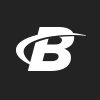Okay, here is what you diet needs to be like to build muscle. Every day you need to eat 1.5 - 2 grams of protein per lbs. bodyweight. This sounds like a lot, but is easy to do. Next, make sure you are eating enough calories. You should eat as many calories as possible while not gaining fat. You need a lot of complex carbohydrates(not only do they account for most of your calories, but these are what "fill you up" and give you the much needed energy.)
For example: During my "offseason" (term refering to the time not dieting for a competition,) I was eating 3,000 to 4,000 calories a day. Your daily caloric intake should be as much as possible but without getting fat, as I already mentioned. Just be sure to spread them out evenly. Make sure that you are not eating too much sugar or that will lead to gaining fat as well. 5 - 6 meals daily will suffice with 2 - 3 hours between each "feeding".
If you notice that you are gaining fat, reduce daily caloric intake by 300 calories for a week and keep doing so until you stop gaining fat. For this reason, it is imperative to measure your bodyfat once a week to make sure that the weight that you are gaining is not fat. You can get a skinfold caliper that measures bodyfat just about anywhere and for cheap.
You need to purchase a food scale. You will also need to record when you eat, what you eat, and how much of it you eat. Microsoft Excel is an excellent program to use, as it can be saved, and will add up all of your total calories, protein, fats, and carbohydrates. You also want to make sure that you are not allergic to any foods that you have never tried. For example: if you have never tried green beans, don't eat a lot at first. Be Smart.

Supplements
Supplementation plays a HUGE role in getting enough nutrients. Supplements come in many shapes, forms, and sizes. I feel that the most important supplements include the following: Protein Shakes (Both Low-Carb and High-Carb), Protein Bars (Both Low-Carb and High-Carb), Amino Acid Supplements, Vitamins, and Creatine Monohydrate.
Protein Shakes as well as bars can be an excellent source of: Protein, calories, carbohydrates, as well as many vitamins and amino acids. Protein Shakes and Bars are convenient and some actually taste good! Amino Acid Supplements help the body reach peak levels of growth by supplying additional high-quality protein.

Amino Acids
Amino Acid Supplements can also be metabolized in the muscle, decrease muscle catabolism (breakdown) by acting as extra energy during exercise. Vitamins play a vital role in health and now I understand why my mother always made me take them as I grew up. Vitamins are the substances that your body uses for all of it's metabolic processes. Vitamins provide the nutrients necessary for growth and repair.
Many products out there are considered multivitamins and are excellent. Creatine Monohydrate is a fabulous new supplement that first became popular in the 90's. As users nation-wide reported immediate, massive results, many others tried and also received results. An immediate gain of ten-pounds of lean mass is common and has found a home on every serious bodybuilder's supplement bag.
Here are some meal plan examples:

Day 1

Meal 1:
- 6 Egg Whites, 1 Yolk
- 4 oz Chicken Breast
- 1/2 cup Oatmeal
- 1 Apple
Meal 2:
- 1 Meal Replacement Shake
Meal 3:
- 10 oz Chicken Breast
- 1/2 cup Rice
- 4 cups of Salad
- 2 tbsp of Dressing
Meal 4:
- 2 cans Tuna (in water)
- 1 cup Rice
- 2 Carrots
Meal 5:
- 1 Meal Replacement Shake
Meal 6:
- 10 oz Steak
- 2 Baked Potatoes
- 2 cups Vegetables

Day 2
Meal 1:
- 6 Egg Whites Scrambled
- 2 packets Instant Oatmeal
- 1 serving Strawberries
Meal 2:
- 1 Meal Replacement Shake
Meal 3:
- 10 oz Steak
- 1 serving Potatoes
- 1 cup Green Beans
Meal 4:
- 2 Protein Bars
Meal 5:
- 10 oz Chicken Breast
- 1 cup Rice
- 1 cup Cauliflower
Meal 6:
- 10 oz Catfish
- 1 serving Potatoes
- 1 cup Squash

Day 3
Meal 1:
- 1 Meal Replacement Shake
Meal 2:
- 10 oz Grilled Chicken Breast
- 1 cup Green Beans
- 1 cup Spinach
Meal 3:
- 2 Protein Bars
Meal 4:
- 10 oz Steak
- 1 cup Corn
- 1 cup diced Tomatoes
Meal 5:
- 6 Egg Whites
- 1 cup Oatmeal
- 2 large Carrots
Meal 6:
- 1 Meal Replacement Shake

Day 4
Meal 1:
- 3 Egg Whites
- 1 Protein Bar (High-Carb)
- 1 cup Celery
Meal 2:
- 10 oz Cod
- 1 serving Potatoes
- 1 cup Green Beans
Meal 3:
- 2 Protein Bars
Meal 4:
- 10 oz Steak
- 1 cup Rice
- 1 cup Peppers
Meal 5:
- 1 Meal Replacement Shake
Meal 6:
- 10 oz Salmon
- 2 Baked Potatoes
- 1 cup sliced Cucumber
This is only a sample of a muscle-building diet. Notice that the Meal Replacement Shakes and Bars do not have to be for the same meals each day or that there is a set number of them you drink a day. You can insert different foods into each meal.

Protein And Carbohydrate Food Sources
You should get carbs from:
- Green Beans
- Oatmeal
- Potatoes
- Rice
Protein can come from protein shakes and bars (make sure there is minimal sugar) and from lean meats, such as:
- Chicken Breast
- Fish
- Steak, etc.
All fruits and vegetables are acceptable and should be eaten.
